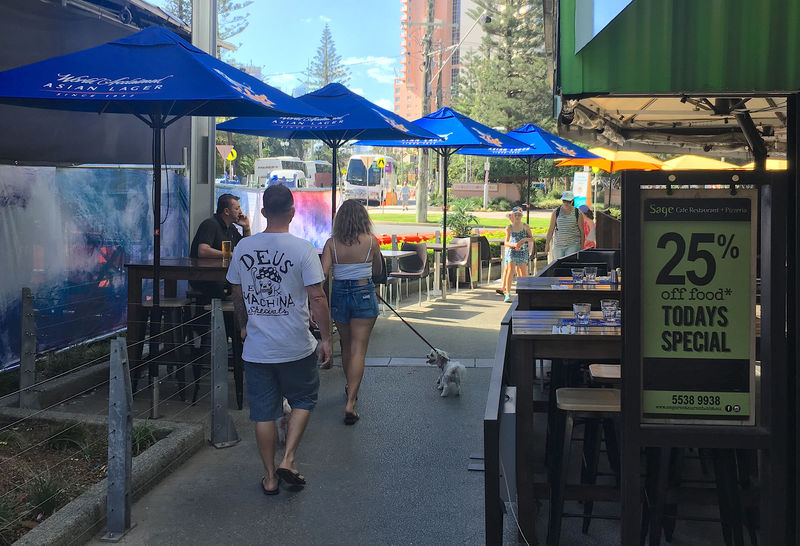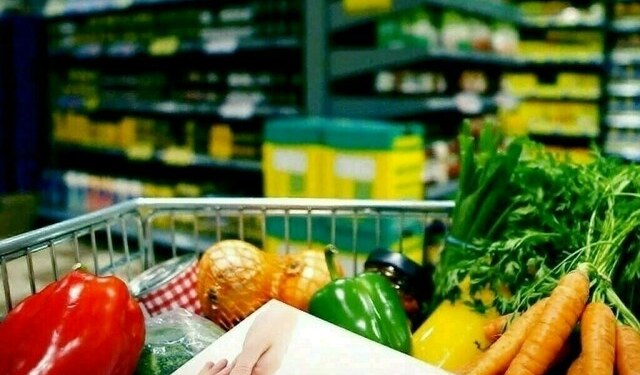 © Reuters. Pedestrians walk past empty restaurants located in Broadbeach on the Gold Coast
© Reuters. Pedestrians walk past empty restaurants located in Broadbeach on the Gold CoastBy Ian Ransom
GOLD COAST, Australia (Reuters) – A few minutes’ walk from the Commonwealth Games basketball venue, a deflated Armando Cozzolino surveys empty tables and idle waitstaff at La Roma restaurant, waiting for a promised business dividend that has stubbornly refused to come.
For 12 years, the Naples-born Gold Coast resident has paid steep rents for his coveted corner space in the usually bustling entertainment precinct of Broadbeach, but he can not remember business ever being so bad.
“Compared to usual, we’re down about 60-70 percent in revenues,” Cozzolino told Reuters of his takings during the Games period.
“For the last three months, we have a big problem, we’ve got to pay lots of bills. We didn’t expect it to be like this.”
A survey of Cozzolino’s neighbors reveal similar struggles across the length of the retail strip where high-rise holiday accommodations usually produce a steady stream of tourists to pack out the local cafes and restaurants.
Gold Coast organizers claim to have sold more than 96 percent of the 1.2 million tickets and forecast that 670,000 visitors would descend on the balmy resort in southern Queensland state during the April 4-15 Games.
Crowds have been impressive at the sports venues, with a number of events sold out, but local businesses have been stunned by the lack of foot traffic and commerce.
Hotels that raised their rates in expectation of a windfall have hastily cut them and many have less than half their usual occupancy, said one Broadbeach hotelier who declined to be named.
David Bennedick, the boss of a nearby local cafe, reported that 18 retail businesses in the immediate neighborhood had failed in the months leading up to the quadrennial event as traffic and parking restrictions began to bite.
Business owners lay the blame squarely at the feet of the Gold Coast organizing committee (GOLDOC), which urged local residents to avoid driving in a sprawling city of 560,000 that has long been slave to the automobile.
The local government’s “scare campaign” — and the decision to stage the Games during school holidays — had turned away locals and tourists alike, said Roger Laganin, general manager of the Phoenician Resort, a hotel at Broadbeach.
“It’s been a complete disaster,” said Laganin. “They have scared everyone away. It’s caused a lot of grief for people around here.”
During the opening week of the Games, Gold Coast Mayor Tom Tate was forced into a hasty apology after telling disgruntled local businesses to “to get out there and market”.
“I’m sorry my support for business has been misinterpreted,” Tate said in a statement published by local media.
“I respect that businesses have done a lot to be ‘Games ready’.”
Further down the coast in Coolangatta, spectators packed out the 4,000-seat beach volleyball venue throughout the week-long tournament.
Yet, the nearby shopping center was so quiet at times “you could fire a bullet and no-one would notice”, said Bruce Eder, an Uber driver from the nearby suburb of Currumbin Waters.
“We thought it would go berserk. It’s been bad for drivers,” added Eder.
“They were saying it would be mayhem, with traffic jams causing four-hour trips from Brisbane, rather than the usual 1.5 hours.
“It’s not happened anywhere near like that because everyone’s just left town for the Games.”
Back at La Roma restaurant in Broadbeach, Cozzolino said he had no intention of seeing any of the events at the Games.
It was not out of protest or any ill will towards them.
“No, I’ve got to work, I’ve got to pay my bills,” he said.
Source: Investing.com



























